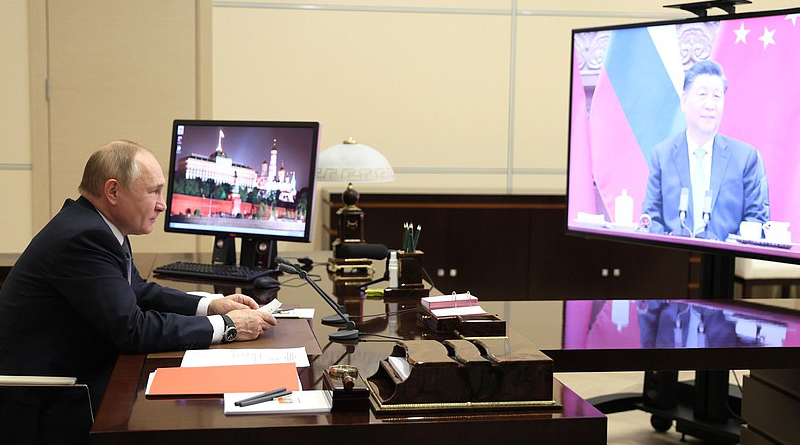
Russian President Vladimir Putin had been isolated on Ukraine in a series of major summits throughout December, but that changed significantly on Wednesday when his Chinese counterpart Xi Jinping offered his strong support, strengthening an emerging Moscow-Beijing axis.
The Chinese premier’s alliance with Putin — one of the key factors emboldening Russian foreign policy in recent years — has significant implications not only for geopolitics but also the global economy. With both men potentially in power until well into the 2030s, they may well be seen by future historians as the two dominant figures in international relations in the first three to four decades of the 21st century.
The warmth of bilateral ties is very much driven by the apparent personal camaraderie between the two. Putin, who refused to travel to the G20 or COP26 summits in recent weeks, on Wednesday highlighted his delight at plans to attend the Beijing Winter Olympics next February when much of the West will stage a diplomatic boycott to protest China’s human rights record. Xi clearly welcomes Putin’s support, saying that “both sides should strengthen coordination and cooperation on international affairs to make louder voices on global governance.”
On Ukraine, Xi left no doubt where he stands, saying that he “understands Russia’s concerns to work out security guarantees,” given NATO’s perceived encroachment on Moscow’s former territories. He added that “both China and Russia need to carry out more joint actions to more effectively safeguard our security and interests” against the Western powers, and expressed his appreciation that Putin “strongly supported Beijing’s efforts to protect key national interests and firmly opposed attempts to drive a wedge between our countries.”
The standoff on the Ukraine border may die down again in 2022, as happened in spring when Russian troops last mobilized there in their tens of thousands, but that is by no means guaranteed. Putin’s mission since assuming power almost a quarter of a century ago has been to restore Russia’s geopolitical prominence through international gambits such as the annexation of Crimea and the intervention in Syria.
Putin is also targeting Africa, seeking to restore Moscow’s influence in the region that faded after the collapse of the Soviet Union. He is keen to entrench Russia’s economic and political foothold in the continent, with bilateral trade having risen significantly in the past decade.
While Putin’s foreign policy escapades have — so far at least — generally played well domestically, they have resulted in much frostier relations with the West. A key question in coming years is how the relationship, specifically with the US, will fare under President Joe Biden, who will remain in office until at least early 2025, but may not choose to seek re-election when he is his 80s.
As last week’s Biden-Putin summit highlighted, the most likely outcome is continuing frosty ties. Putin, at 69, may already be thinking ahead to the next US president, hoping for another maverick figure more congenial to his interests, potentially even Donald Trump again. The Russian leader knows that he could yet see out several more US leaders if he wins two more terms of office by which time he would surpass even Joseph Stalin’s time in power.
Yet, while Putin appears to be firmly entrenched, if not impregnable, numerous challenges remain. The pandemic, for one, has posed a major problem, particularly after a wave of infections in recent weeks.
This underlines that Putin is far from certain to serve till 2036, especially if his political luck finally goes south, fueled by potential foreign policy misadventure or domestic economic travails. To keep his hold in power, it seems likely that Putin will continue to rely on the playbook that has served him well so far — namely, forging a sense of post-Cold War patriotism of which the current build-up in Ukraine may be only the latest example.
This could have profound implications, especially given his growing closeness to Xi, who is another potential “president for life.” The closeness of their relationship is one key reason the frost appears unlikely to thaw in Russia’s relations with the West. In this context, Putin is increasingly asserting Russian power in other areas of the globe from Asia-Pacific to Africa and the Americas, doubling down support for longstanding allies who are Western foes, including Venezuela, Syria, North Korea and Iran.
The implications of Putin’s long period in office go well beyond the Russian domestic political landscape and Ukraine. The key foreign legacy of his presidency is likely to be a significantly closer relationship with Beijing, which poses a much broader, potentially defining, challenge for the West in the coming decades.
